Assam government’s dubious decisions and bias actions are giving birth to new problems for the
peaceful citizens of the state day by day. The Dimasa dominated North Cachar Hills Autonomous Council
had earlier in the year 2008 demanded to change the name of the district after the Dimasa. The district’s
Non-Dimasa people raised their voice against this demand. They formed a new platform to protest by
the name of Indigenous Peoples’ Forum (IPF).
The Government of Assam bowed down before the tyrannical demand of DHD(J) to change the districts
name as Dima Hasao on March 30,2010 in the backdrop of the rupees thousand crore scam in the
district, said IPF General Secretary, Ngaidam Puruolte, while addressing the media persons in Guwahati
on October 30,2012.
He said that the N C Hills Autonomous District Council was formed in 1952 with a view to bring about
all round development to the various backward Hill Tribal people of the N C Hills district. At the time of
its inception of the Council there were six (6) members from Dimasa community and an equal number
of non-Dimasa communities. The agreement among the leaders of that time was reached that if the
lone member of the state Assembly is Dimasa, the Chief Executive Member (CEM )of the Council would
be a non-Dimasa and vice versa. Accordingly, a Dimasa, J B Hagzer was the first MLA from the district
and a Hmar Chawnhau Khawthlang became the first CEM of the Council. However, this agreement
could not last for long and Chawnhau Khawthlang remained the first and last CEM from the non-Dimasa
community.
There were delimitations of the MDC constituencies to the council in the years 1967 and 1978 in which
the number of the Dimasa members was increased from 6 to 15 and that of Non Dimasas from 6 to 8
only. After these delimitations, the Dimasas applied their policy of dominating the Council. On the other
hand, the innocent non-Dimasas remained unaware of their hidden designs and were satisfied to remain
peaceful under communal harmony, Puruolte said.
He alleged that the Dimasas through their students’ organization, the Dimasa Students’ Union
(DSU) raised slogans as ‘Cachar for Kacharis’ and’ N C Hills for Dimasas’ and claimed that 90 percent
reservation of all government jobs and other facilities for the Dimasas in early 1980s. At this point,
the non-Dimasas could know about their evil designs and to fight against it they formed a non-Dimasa
platform called All Tribal Integrated Committee (ATIC). A rift between Dimasas and non-Dimasas
emerged in the history of NC Hills‘ politics from that time, the IPF leaders explained.
The Dimasas in their attempt to turn the district into exclusively theirs, tried to change the name of the
district after the word Dimasa into Dima Halali in 2001.The non-Dimasas also to counter their move
formed a forum in the name of Indigenous Tribes Front (ITF). Due to strong opposition the proposal for
the change of name of the district was dropped.
Afterwards, the Dimasas switched over to ethnic cleansing policy. In their attempt to oust other tribes
one by one from the district started waging ethnic clashes with the help of the DHDs against the Hmar
in 2003, against the Karbis in 2005 and against the Zeme Nagas in 2009. By this the Dimasas dominated
over the N C Hills Autonomous Council and tried to change district’s name and ultimately succeeded
by signing a peace accord for Dima Hasao Territorial Council by both factions of Dimasas through a
tripartite agreement with Government of India and Assam government on October 8,2012. The N C Hills
district was renamed by ‘force’ Dima Hasao on March 30,2010, the IPF alleged.
It may be mentioned in this connection that Dima Hasao district has 35 percent population of Dimasas
according to electoral rolls of 2008. However, considering all the facts non-Dimasas are disappointed
and feel that there is no chance for survival of non-Dimasa communities in Dima Hasao district and
therefore they demand for creation of a separate non-Dimasa Autonomous District for them. The non-
Dimasas argument is that if for 35 percent population of Dimasas an autonomous district could be
constituted there is no harm in constituting an autonomous council for 65 percent non-Dimasas. Their
demand is to give them a home land where they can live in peace, IPF leaders said.
- Add new comment
- 22388 reads



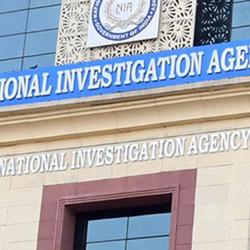

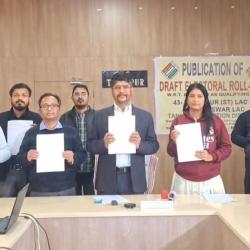
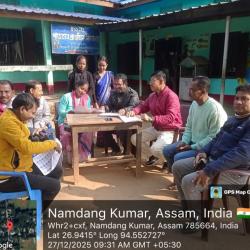
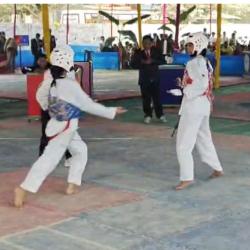
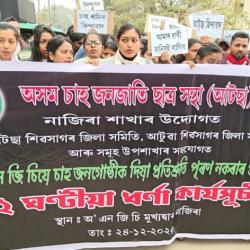

Comments
Pages
Add new comment